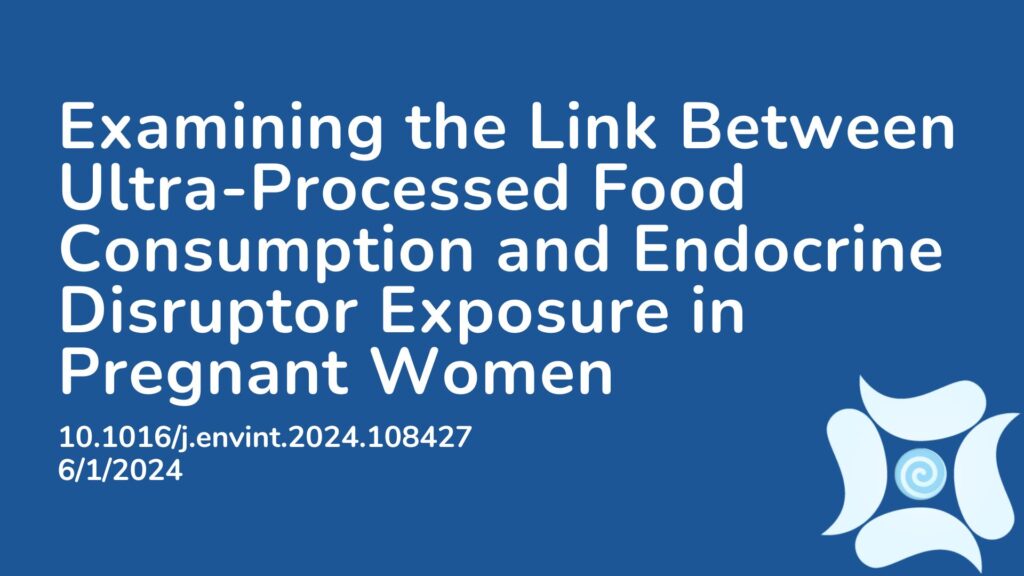Summary:
The recent increase in global consumption of highly processed foods has raised concerns about its potential link to chronic diseases. Diets high in ultra processed foods may impact health through the presence of chemicals intentionally added to processed foods, like phthalates, which can contribute to human disease. Phthalates are endocrine disruptors which are widely used in plastics and personal care products, and can leach into the environment and pose health risks, particularly for pregnant women and children. Diets high in processed foods lead to higher phthalate exposures compared to diets rich in fresh foods. While studies have shown associations between processed food consumption and phthalate exposure, further research is needed to confirm these links. This study aimed to investigate associations between ultra-processed food consumption and phthalate exposures in pregnant women. It also explored whether socioeconomic status mediates the relationship between processed food consumption and phthalate exposure. The study included 1,031 pregnant women representing various socioeconomic backgrounds. A food frequency questionnaire was used to assess dietary habits, and urinary phthalate metabolites were measured during the second trimester. The results showed that ultra-processed foods accounted for up to 59% of the participants’ diets. A 10% increase in the proportion of ultra-processed foods in the diet was associated with a 13.1% higher concentration of phthalate metabolites. Conversely, a 10% increase in the consumption of minimally-processed foods was linked to a 10.8% reduction in phthalate metabolite levels. Consumption of specific ultra-processed foods such as hamburger/cheeseburger, French fries, soda, and cake was also highly correlated with phthalate metabolite levels. The results also suggested that lower income and education levels were associated with higher phthalate metabolite levels, partly mediated by increased consumption of ultra-processed foods.
Abstract:
Background: Consuming ultra-processed foods may increase exposure to phthalates, a group of endocrine disruptors prevalent in food contact materials.
Objectives: Investigate associations between ultra-processed food intake and urinary phthalates during pregnancy, and evaluate whether ultra-processed foods mediate socioeconomic disparities in phthalate exposures.
Methods: In a socioeconomically diverse sample of 1031 pregnant women from the Conditions Affecting Neurocognitive Development and Learning in Early Childhood (CANDLE) Study in the urban South, the Block Food Frequency Questionnaire was administered and urinary phthalate metabolites were measured in the second trimester. Linear regressions modeled associations between phthalates and overall ultra-processed food consumption, individual ultra-processed foods, and exploratory factor analysis dietary patterns. Causal mediation analyses examined whether ultra-processed food intake mediates relationships between socioeconomic disparities and phthalate exposures.
Results: Ultra-processed foods constituted 9.8–59.0 % (mean = 38.6 %) of participants’ diets. 10 % higher dietary proportion of ultra-processed foods was associated with 13.1 % (95 %CI: 3.4 %–22.9 %) higher molar sum concentrations of di(2-ethylhexyl) phthalate metabolites (ΣDEHP). 10 % higher consumption of minimally-processed foods was associated with lower ΣDEHP (10.8 %: 3.4 %–22.9 %). Ultra- and minimally-processed food consumption were not associated with non-DEHP metabolites. Standard deviation higher consumptions of hamburger/cheeseburger, French fries, soda, and cake were associated with 10.5 % (4.2 %–17.1 %), 9.2 % (2.6 %–16.2 %), 7.4 % (1.4 %–13.6 %), and 6.0 % (0.0 %–12.4 %), respectively, higher ΣDEHP. Exploratory factor analysis corroborated positive associations of processed food with ΣDEHP, and uncovered a healthy dietary pattern associated with lower urinary ΣDEHP, mono(2-ethyl-5-hydroxyhexyl) (MEHHP), mono(2-ethyl-5-carboxypentyl) (MECPP), mono(2-carboxymethylhexyl) (MCMHP), and mono-isononyl (MINP) phthalates. Significant indirect effects indicated that lower income and education levels were associated with 1.9 % (0.2 %–4.2 %) and 1.4 % (0.1 %–3.3 %) higher ΣDEHP, respectively, mediated via increased ultra-processed food consumption.
Conclusions: Consumption of ultra-processed foods may increase exposure to phthalates. Policies to reduce dietary phthalate exposures from food packaging and processing are needed, as socioeconomic barriers can preclude dietary recommendations as a sole means to reduce phthalate exposures.
Article Publication Date: 6/1/2024
DOI: 10.1016/j.envint.2024.108427




